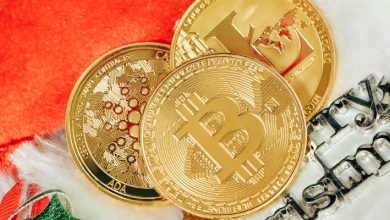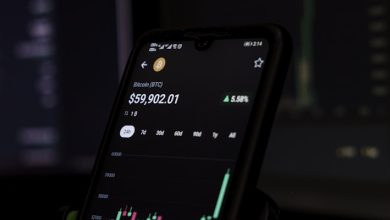A Beginner’s Guide to Bitcoin and Altcoins

- A Brief History of Bitcoin
- What are Altcoins and How Do They Differ from Bitcoin?
- How to Buy and Store Bitcoin and Altcoins Safely
- The Risks and Rewards of Investing in Cryptocurrencies
- Understanding Blockchain Technology and its Role in Bitcoin and Altcoins
- The Future of Bitcoin and Altcoins: Trends to Watch for in the Market
A Brief History of Bitcoin
Bitcoin, the first cryptocurrency, was created in 2009 by an unknown person using the pseudonym Satoshi Nakamoto. It operates on a decentralized network called blockchain, which is a public ledger of all transactions that have ever taken place. Bitcoin allows for peer-to-peer transactions without the need for a central authority or intermediary.
Since its inception, Bitcoin has experienced significant growth and adoption, becoming a popular digital asset for investment and online transactions. Its value has fluctuated over the years, with periods of rapid appreciation followed by sharp declines. Despite this volatility, Bitcoin has garnered a large following of supporters who believe in its potential as a store of value and medium of exchange.
Over time, Bitcoin has inspired the creation of thousands of alternative cryptocurrencies, often referred to as altcoins. These digital assets seek to improve upon the limitations of Bitcoin, offering different features such as faster transaction speeds, enhanced privacy, and more efficient consensus mechanisms. Altcoins have diversified the cryptocurrency market, providing investors with a range of options beyond Bitcoin.
As Bitcoin and altcoins continue to evolve, they are reshaping the financial landscape and challenging traditional forms of money and banking. The rise of cryptocurrencies has sparked debate among policymakers, economists, and technologists about the future of money and the impact of decentralized technologies on society. Despite the uncertainties and regulatory challenges, the popularity of Bitcoin and altcoins shows no signs of slowing down.
What are Altcoins and How Do They Differ from Bitcoin?
Altcoins are cryptocurrencies other than Bitcoin. They were created as an alternative to Bitcoin, with different features and purposes. Some of the most popular altcoins include Ethereum, Ripple, Litecoin, and Dash. Altcoins use similar technology to Bitcoin, such as blockchain and decentralized ledger systems, but they often have unique features that set them apart.
One key difference between altcoins and Bitcoin is their mining algorithms. While Bitcoin uses the SHA-256 algorithm, many altcoins use different algorithms like Scrypt or X11. This can affect the way new coins are mined and distributed, as well as the level of security and decentralization of the network.
Another difference is the way altcoins are used. While Bitcoin is primarily seen as a digital currency and a store of value, many altcoins have additional use cases. For example, Ethereum is known for its smart contract functionality, while Ripple is focused on facilitating cross-border payments. This diversity of use cases can make altcoins appealing to a wider range of users.
How to Buy and Store Bitcoin and Altcoins Safely
When it comes to buying and storing Bitcoin and alternative cryptocurrencies, it is crucial to prioritize safety and security. Here are some essential tips to ensure you are protecting your investments:
- Research reputable exchanges: Before purchasing Bitcoin or altcoins, make sure to research and choose a reputable cryptocurrency exchange. Look for platforms with a strong track record of security and user trust.
- Use hardware wallets: Consider investing in a hardware wallet to store your digital assets securely offline. Hardware wallets are considered one of the safest options for long-term storage.
- Enable two-factor authentication: Protect your exchange accounts and digital wallets by enabling two-factor authentication (2FA). This adds an extra layer of security by requiring a second form of verification.
- Keep private keys secure: Your private keys are essential for accessing and managing your cryptocurrency holdings. Make sure to store them in a safe and secure location, such as a hardware wallet or encrypted USB drive.
- Regularly update security measures: Stay proactive about updating your security measures, including passwords, software, and firmware. This helps protect your investments from potential vulnerabilities.
By following these guidelines and taking the necessary precautions, you can buy and store Bitcoin and altcoins safely. Remember that the cryptocurrency market can be volatile, so it is essential to prioritize security to safeguard your investments.
The Risks and Rewards of Investing in Cryptocurrencies
Investing in cryptocurrencies can be a lucrative opportunity for those willing to take on the risks associated with this volatile market. It is essential to understand the potential rewards as well as the potential pitfalls before diving in.
One of the main advantages of investing in cryptocurrencies is the potential for high returns. Bitcoin and altcoins have shown impressive growth over the years, with some investors seeing astronomical gains in a short period. This has attracted many people to the market in search of quick profits.
However, it is crucial to remember that with high rewards come high risks. The cryptocurrency market is known for its extreme volatility, with prices often experiencing significant fluctuations in a short period. This can result in substantial losses for investors who are not prepared to weather the storm.
Another risk of investing in cryptocurrencies is the lack of regulation. Unlike traditional financial markets, the cryptocurrency market is largely unregulated, which can make it susceptible to fraud and manipulation. Investors should be cautious and do their due diligence before investing in any digital assets.
In conclusion, investing in cryptocurrencies can offer significant rewards, but it is essential to be aware of the risks involved. By understanding the market dynamics, staying informed, and being prepared for volatility, investors can make informed decisions and potentially benefit from this exciting asset class.
Understanding Blockchain Technology and its Role in Bitcoin and Altcoins
Blockchain technology is a decentralized, distributed ledger system that records transactions across a network of computers. This technology plays a crucial role in the functioning of cryptocurrencies like Bitcoin and altcoins.
Blockchain technology ensures transparency and security by creating a chain of blocks that contain transaction data. Each block is linked to the previous one, making it difficult for anyone to alter the information retroactively. This makes blockchain technology tamper-proof and resistant to fraud.
When a transaction is initiated using Bitcoin or altcoins, it is verified by a network of computers (nodes) through a process known as mining. Miners solve complex mathematical problems to validate the transaction and add it to the blockchain. This process ensures the integrity of the transaction and prevents double-spending.
Blockchain technology eliminates the need for intermediaries like banks or payment processors, allowing for peer-to-peer transactions to occur directly between users. This not only reduces transaction costs but also increases the speed at which transactions are processed.
The Future of Bitcoin and Altcoins: Trends to Watch for in the Market
When looking at the future of Bitcoin and altcoins, there are several key trends to keep an eye on in the market. As the cryptocurrency space continues to evolve and mature, it’s important for investors and enthusiasts alike to stay informed about what’s happening in the industry.
One trend to watch for is the increasing mainstream adoption of Bitcoin and altcoins. As more and more people become familiar with and comfortable using cryptocurrencies, we can expect to see a surge in popularity and usage. This could lead to significant price increases and market growth in the coming years.
Another trend to pay attention to is the development of new technologies and innovations in the cryptocurrency space. From improved security measures to faster transaction speeds, there are constantly new advancements being made that could have a big impact on the market. Keeping up with these developments can help investors make more informed decisions about where to put their money.
Regulatory changes are also something to monitor closely. As governments around the world grapple with how to regulate cryptocurrencies, there could be significant shifts in the market depending on the decisions that are made. It’s important to stay informed about these changes and understand how they could affect the value of Bitcoin and altcoins.



